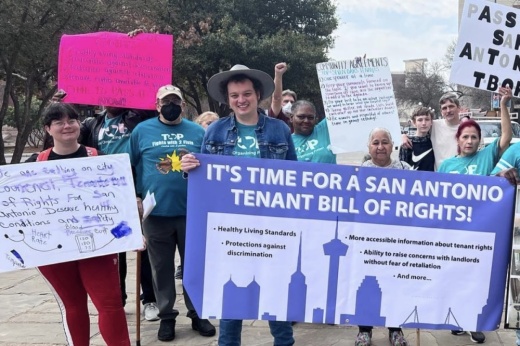Following action from a San Antonio City Council committee on Feb. 23, the entire City Council plans to vote this spring on programs designed to root out suspect apartment landlords and better protect renters.
City staff briefed the council’s planning and community development committee on the imminent launch of the Proactive Apartment Inspections Task Force, which will proactively inspect multifamily residential properties to ensure those properties comply with minimum health and safety housing standards.
The committee was also briefed on the city’s fair housing and tenants’ rights awareness campaign.
Regarding the inspections program, a city task force that met in 2022 made recommendations after learning about poor living conditions discovered and reported at a handful of apartment complexes around town.
In one example, local officials said tenants at the Seven Oaks community in northwest San Antonio spent weeks or months without air conditioning.
City inspectors also found other violations and problems, such as water leaks and mold, at the same apartment complex. As a result, Seven Oaks residents formed a tenants’ union, local officials said.
Development Services Director Michael Shannon said the city would require properties containing five or more units to register for placement on a so-called “bad actor list” within six months of receiving three citations following the issuance of a city code violation.
Shannon also said because the penalized property owner would have to pay for placement on the city’s bad actor list, the fee should serve as a deterrent for suspect landlords and help the new inspections program become more self-sustaining. The fee amount has not yet been determined, he added.
This program will involve one code enforcement supervisor, four officers and one senior management analyst, Shannon said. The new apartment code enforcement team would cost $388,000 in its first year, he added.
Shannon said the city has tried to bolster its code compliance efforts when it comes to certain multifamily rental properties, including adding two code officers in September to focus on apartment code enforcement calls and inspections. Two of the existing officer positions will be rolled into the new inspections program budget.
Ultimately, Shannon said the inspections program is meant to incentivize good property management at apartment complexes to ensure the health, safety and welfare of their residents, and to hold accountable apartment property owners who fall short of following basic housing safety standards.
“We can also proactively verify compliance on properties that need it the most,” Shannon said.
Once registered, a property is subject to proactive monthly inspections for at least six months, a time period that enables the property owner to correct code violations and meet other requirements, Shannon said.
Shannon also said a property owner may appeal a citation within 10 calendar days of the citation being issued and have the burden to show enough evidence to get a citation dismissed.
According to the city, landlords are usually referred to municipal court to address citations, which provide a maximum fine of $300 with potential of the city pursuing criminal misdemeanor charges, if warranted.
Several members of grassroots groups Texas Organizing Project and Texas Housers attended the council committee meeting, expressing general support for the new inspections program, but had concerns about the length of time for appeals.
Shannon said the program was developed with input from a range of stakeholders, including affordable and safe housing advocates, and property management and apartment development groups.
The committee also got a sneak peek at a proposed tenants’ rights resolution that, if approved by the full council, would be part of a city-organized public awareness campaign designed to inform renters of their rights, especially those at risk of eviction or those living in poor conditions.
The resolution, Assistant City Manager Lori Houston said, will mirror existing local, state and federal laws that pertain to basic tenant protections, including the right to advance eviction notice requirements and the right to seek immediate home maintenance to address health and safety worries.
Houston also said the public education campaign will incorporate information that landlords are required to extend to tenants facing an eviction notice, and that the campaign material will be made available in English and Spanish.
The aforementioned grassroots organizations and others attending the council committee meeting said they have long sought a sort of tenants’ bill of rights, but hoped the city would go further by setting up an oversight panel to ensuring landlord accountability.
Houston said the council plans to get feedback on the proposed tenants’ rights resolution from the city’s housing commission, community members and other stakeholders before the council votes on the document by June.
District 4 Council Member Adriana Rocha Garcia said the proposed fair housing and tenants’ rights awareness campaign complements the goals of the Proactive Apartment Inspections Task Force.
“Making this information accessible to renters and available in different languages will be key to ensuring renters are aware of the federal and state laws already in place to protect renters,” Garcia said in a statement. “Through an education campaign developed with input from various stakeholders, the city of San Antonio can take on an active approach to empower our renters as we work to address the enforcement of violations.”





